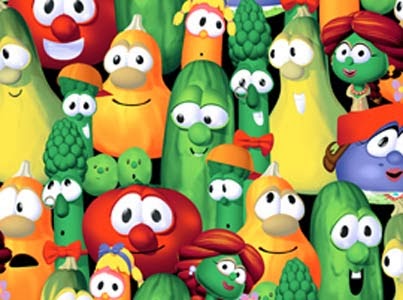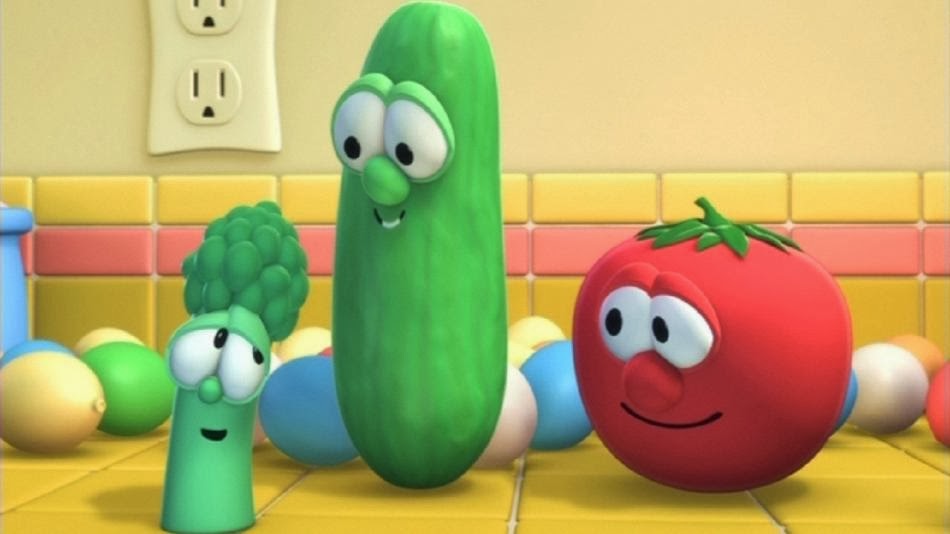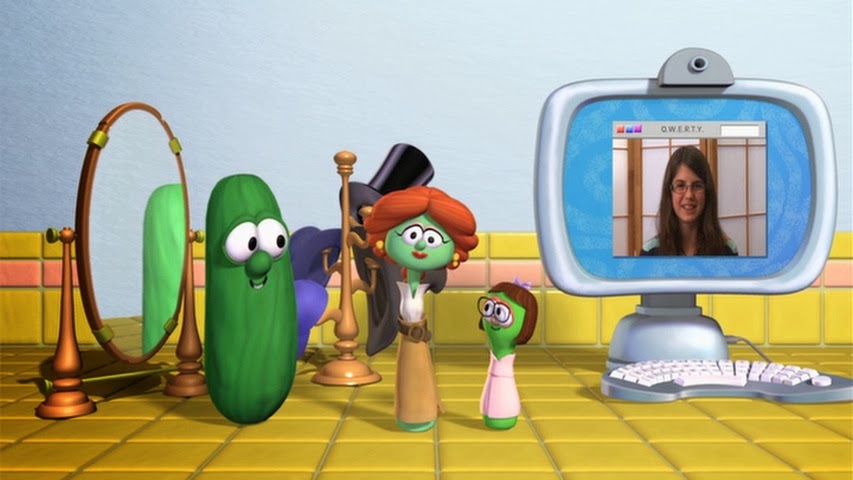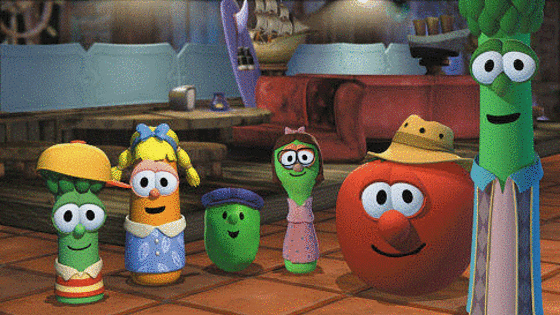So before we go into this, I want you all to know that I secretly (not very secretly at all) adore Veggie Tales. I was a little bit older than the target demographic when they started coming out, but that has in now way stopped me from loving those little Bible-verse spewing vegetables with my whole childish heart. I have at various points in my life own plushies of Bob, Larry, and Junior Asparagus, and I totally was super pumped the year Mom gave me the Veggie Tales Christmas Album in my stocking.
I saw this not to establish that I am a dork (have you met me?) but to explain that when I criticize this show, as I am about to do, I do it out of a place of love. As Veggie Tales themselves should know, when you love someone or something, you demand that it be its best, because you can see the good there, and you are saddened that it is being covered up.
Covered up, in this case, by hair.
I get what you're thinking - namely, "Huh?" - and I will endeavor to explain. Veggie Tales is a series of short to feature length computer animated films that center around a bunch of vegetables reenacting stories from the Bible, or just going through basic religious analogies. They were created to give kids a fun and unique way to learn about the Bible, and from that perspective, they're dang cute. They're not super preachy, the songs are hella catchy (I still have that album), and the characters are fun. Overall, they're an easy, quick way for religious parents to give their kids some Biblical education without boring the pants off them or trying to ram it down their throats. And speaking as someone who remembers BibleMan (shudder), I am all for this.
The problem with Veggie Tales isn't so much in the content as in the way that the content is brought to life: the characters. Our main characters are all male: Larry the Cucumber, Bob the Tomato, Junior Asparagus, Archibald Asparagus, Pa Grape, and so on. I mean, literally, I can keep going off, just naming male characters who had some level of important role in the stories, recurring characters who just so happened to be male.
That in and of itself isn't weird. I mean, it's a little weird that we're giving vegetables defined genders, but then it's also weird that a bunch of vegetables built a pirate ship in the sink and somehow got ahold of vegetable sized laz-e-boys, so what do I know?
No, the issue is when it comes to the female characters. By which I mean that there are hardly any. At all. And the ones there are...suck.
Just going off the top of my head here, these are the female characters I can name from the Veggie Tales movies: that weird carrot thing, Junior's mom, Madame Blueberry (who only appeared in her film), and Esther (also only appeared in her film). Oh, and there's another really bizarre thing pulling them all together: only the female vegetables have hair.
Like, again, I don't want to belabor the realism here, because these are vegetables telling Bible stories, but isn't that kind of weird? It seems like they should pick one: either none of the vegetables should have hair (except the peach, and that's really just a one-off joke), or they all do. Making it so that only the female vegetables have hair says something rather uncomfortable about the people who make Veggie Tales. It says that they don't think women are women if they don't have hair.
Stay with me here.
It has to do with gender differentiation when you're dealing in a medium where there is no natural gender distinction. This is a kids' program, so they're not about to give a vegetable breasts, right? And besides breasts, when you get down to it, there really aren't any other super distinctive secondary sexual characteristics that differentiate men from women. There certainly aren't any when you come to vegetables.
What we're left with, then, are cultural characteristics to connote gender differentiation. And since, again, these are vegetables (and occasionally fruit), it's hard to make distinctions. So I guess the animators looked at all of that and though, "Hair. We'll give them hair. And dresses. Oh, and bows! Girls like bows!' And then they were done.
The problem here is that it creates a weird subconscious space in the heads of the little kids they're trying to reach. Boys can be whatever: they can be gourds or grapes or cucumbers or tomatoes or anything in the world. They can be silly or angry or stuffy or bored or anything in the whole wide world. But girls, girls can be pretty. Only pretty.
I mean, look at the female-centric stories that Veggie Tales has chosen to tell: Esther (the story of a girl so pretty she saved the Jews), and Madame Blueberry (an allegory about consumerism and materialism). There are a couple more since I stopped watching, but those, Sweetpea Beauty: A Girl After God's Own Heart and Princess and the Pop Star don't sound particularly promising.
And I want you to remember something really important here. These movies are not old. Veggie Tales started in the nineties. So in the past twenty years, they've managed to have four distinguishably female titles, and only a tiny handful of female characters, none of whom are nearly as prominent as their male characters, and all of whom are bogged down by needless gender signifiers.
For crying out loud, Larry the Cucumber doesn't even wear clothes, let alone "gender appropriate" ones!
All of this bothers me. Partly because it's really kind of distressing that the message they're sending girls is that they should be pretty and stay out of the way, because they have no part in the larger story (which is just wrong, especially Biblically), and partly because if it weren't for this, I would be ready to celebrate this series for their gender coolness!
Because the characters are vegetables (and fruit), the animators seem to have been more comfortable giving the male characters feminine traits. Like, Larry the Cucumber likes soap operas and doesn't feel bad about it, and he cries sometimes, and he's very sweet, and all that. But since there are no female characters to speak of, this doesn't come off as gender equality and open-mindedness, it comes off as just Larry being silly. Not important.
And there are so many opportunities for them to have cool female characters. Even just in the crowd scenes! In Josh and the Big Wall, arguably my favorite, there are literally no female characters. None. Zero. Nada. They have crowd scenes where all the Israelites are gathered, and you know what? All the Israelites are dudes. All the people of Jericho? Dudes. Even the one major female character from that story, who is incredibly instrumental and actually so important that she is listed by name in the lineage of Christ (which is a big deal, for all you non-religious types out there), is totally written out of the story.
Hmmph.
What this all does is send the message that girls are nice and pretty, but ultimately they don't matter to the larger story. And that's just crap.
So, Veggie Tales, please fix this. I want to be able to show you to my kids someday, but I don't want to show them something that could give them the wrong impression of God and his love for everyone, of both genders. Be better than this.
I saw this not to establish that I am a dork (have you met me?) but to explain that when I criticize this show, as I am about to do, I do it out of a place of love. As Veggie Tales themselves should know, when you love someone or something, you demand that it be its best, because you can see the good there, and you are saddened that it is being covered up.
Covered up, in this case, by hair.
I get what you're thinking - namely, "Huh?" - and I will endeavor to explain. Veggie Tales is a series of short to feature length computer animated films that center around a bunch of vegetables reenacting stories from the Bible, or just going through basic religious analogies. They were created to give kids a fun and unique way to learn about the Bible, and from that perspective, they're dang cute. They're not super preachy, the songs are hella catchy (I still have that album), and the characters are fun. Overall, they're an easy, quick way for religious parents to give their kids some Biblical education without boring the pants off them or trying to ram it down their throats. And speaking as someone who remembers BibleMan (shudder), I am all for this.
The problem with Veggie Tales isn't so much in the content as in the way that the content is brought to life: the characters. Our main characters are all male: Larry the Cucumber, Bob the Tomato, Junior Asparagus, Archibald Asparagus, Pa Grape, and so on. I mean, literally, I can keep going off, just naming male characters who had some level of important role in the stories, recurring characters who just so happened to be male.
That in and of itself isn't weird. I mean, it's a little weird that we're giving vegetables defined genders, but then it's also weird that a bunch of vegetables built a pirate ship in the sink and somehow got ahold of vegetable sized laz-e-boys, so what do I know?
No, the issue is when it comes to the female characters. By which I mean that there are hardly any. At all. And the ones there are...suck.
Just going off the top of my head here, these are the female characters I can name from the Veggie Tales movies: that weird carrot thing, Junior's mom, Madame Blueberry (who only appeared in her film), and Esther (also only appeared in her film). Oh, and there's another really bizarre thing pulling them all together: only the female vegetables have hair.
Like, again, I don't want to belabor the realism here, because these are vegetables telling Bible stories, but isn't that kind of weird? It seems like they should pick one: either none of the vegetables should have hair (except the peach, and that's really just a one-off joke), or they all do. Making it so that only the female vegetables have hair says something rather uncomfortable about the people who make Veggie Tales. It says that they don't think women are women if they don't have hair.
Stay with me here.
It has to do with gender differentiation when you're dealing in a medium where there is no natural gender distinction. This is a kids' program, so they're not about to give a vegetable breasts, right? And besides breasts, when you get down to it, there really aren't any other super distinctive secondary sexual characteristics that differentiate men from women. There certainly aren't any when you come to vegetables.
What we're left with, then, are cultural characteristics to connote gender differentiation. And since, again, these are vegetables (and occasionally fruit), it's hard to make distinctions. So I guess the animators looked at all of that and though, "Hair. We'll give them hair. And dresses. Oh, and bows! Girls like bows!' And then they were done.
The problem here is that it creates a weird subconscious space in the heads of the little kids they're trying to reach. Boys can be whatever: they can be gourds or grapes or cucumbers or tomatoes or anything in the world. They can be silly or angry or stuffy or bored or anything in the whole wide world. But girls, girls can be pretty. Only pretty.
I mean, look at the female-centric stories that Veggie Tales has chosen to tell: Esther (the story of a girl so pretty she saved the Jews), and Madame Blueberry (an allegory about consumerism and materialism). There are a couple more since I stopped watching, but those, Sweetpea Beauty: A Girl After God's Own Heart and Princess and the Pop Star don't sound particularly promising.
And I want you to remember something really important here. These movies are not old. Veggie Tales started in the nineties. So in the past twenty years, they've managed to have four distinguishably female titles, and only a tiny handful of female characters, none of whom are nearly as prominent as their male characters, and all of whom are bogged down by needless gender signifiers.
For crying out loud, Larry the Cucumber doesn't even wear clothes, let alone "gender appropriate" ones!
All of this bothers me. Partly because it's really kind of distressing that the message they're sending girls is that they should be pretty and stay out of the way, because they have no part in the larger story (which is just wrong, especially Biblically), and partly because if it weren't for this, I would be ready to celebrate this series for their gender coolness!
Because the characters are vegetables (and fruit), the animators seem to have been more comfortable giving the male characters feminine traits. Like, Larry the Cucumber likes soap operas and doesn't feel bad about it, and he cries sometimes, and he's very sweet, and all that. But since there are no female characters to speak of, this doesn't come off as gender equality and open-mindedness, it comes off as just Larry being silly. Not important.
And there are so many opportunities for them to have cool female characters. Even just in the crowd scenes! In Josh and the Big Wall, arguably my favorite, there are literally no female characters. None. Zero. Nada. They have crowd scenes where all the Israelites are gathered, and you know what? All the Israelites are dudes. All the people of Jericho? Dudes. Even the one major female character from that story, who is incredibly instrumental and actually so important that she is listed by name in the lineage of Christ (which is a big deal, for all you non-religious types out there), is totally written out of the story.
Hmmph.
What this all does is send the message that girls are nice and pretty, but ultimately they don't matter to the larger story. And that's just crap.
So, Veggie Tales, please fix this. I want to be able to show you to my kids someday, but I don't want to show them something that could give them the wrong impression of God and his love for everyone, of both genders. Be better than this.
 |
| "Oui, oui, Jean Claude!" |





Please stop, you obviously don't know what your talking about, so stop bringing feminism into Veggietales, that is wrong on so many levels. As for the female characters if you actually watched all of the episodes then you would realize, there not so bad. On that note I would like to say that, even if veggietales had no female characters, kids would have still loved and indentified with the characters, regardless of gender, if you think kids wouldn't, or you or your kids wouldn't, then you're raising your kids wrong,and you have obviously missed the point of Veggietales. It's not about gender or politics, it's about sharing the Bible stories, messages and truths,(in a quirky funny way), and its about telling the kids about God's love for them, i recommend you go back and watch those videos again, before you go around talking about them.
ReplyDeleteSorry for the typo, I meant to say,"their".
DeleteAgreed! This article should really be complaining of how VT never had any female writers or directors, and most of the regular female character voices get replaced every 5 years - Kristin Blegen, G. Bock, Jackie Ritz, Megan Murphy, Keri Pisapia, and so on and so forth and what have you. Since Cydney Trent always voiced Petunia before Tress MacNeille took over in VeggieTales in the House, I am very disappointed that she never returned to The VeggieTales Show with Lisa Vischer, because Petunia is the most appearing female VeggieTales character who was not recast every 5 or so years. I do not think Lisa counts for that, since Junior is a male character whom you might say has a girly voice.
DeleteExactly. What human kid watching is going to get the impression that "these are the vegetables/fruits that their gender can be?" Laura and Petunia are other female characters this article mentioned whom I think do not suck. I do not think this blogger will be disappointed by Sweetpea Beauty or The Princess and the Pop Star.
DeleteI see the elephant in the room you are telling us about. You made very good points about the problem with female veggies, but you were wrong about Madame Blueberry only appearing in her title film, as is the case with Esther. Among the other female regular VT characters, you forgot to mention Laura Carrot, Annie Onion, and Petunia Rhubarb. Annie and Petunia are both in that image with Larry from Sweetpea Beauty!
ReplyDelete(sigh) This is why VeggieTales needs more female writers. They never had any that I know of, and Lisa Vischer was just a content consultant for three of their films. Why doesn't Lisa Vischer seem to have an interest in writing any VeggieTales, when she has been married to one of the two creators since they started developing VT in 1990?
ReplyDeleteThat is odd. This blog was created in a time when SweetPea Beauty, Twas the Night Before Easter, The Princess and the Pop Star and The Penniless Princess existed, and never once considered the bigger presence of female characters that some of the more recent VeggieTales tales have had? You can't judge VT based on one story, Josh and the Big Wall, so the other four titles I mentioned prove that VeggieTales thinks females do matter and they can be important to the larger story.
ReplyDelete